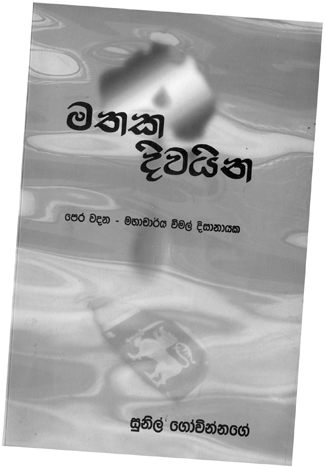Sinhala lyrics from down under
Reviewed by Kalakeerthi Dr. Edwin Ariyadasa
Poetry is when an emotion has found its thought and the thought has
found words.
A poem begins as a lump in the throat, a sense of wrong, a
homesickness a lovesickness.
- Robert Frost (1874-1963) American Poet.
Please picture this scenario.
 In metropolitan London, a thronging, crowding and pressing multitude
of cosmopolitan men and women, is milling around in an eddying human
whirlpool. In metropolitan London, a thronging, crowding and pressing multitude
of cosmopolitan men and women, is milling around in an eddying human
whirlpool.
Their polyglot verbal exchanges, do not penetrate the linguistic
barriers, some individuals have built around themselves. Inside this
enormous gathering, you begin to get the sense of being helplessly
alone.
Voices
Suddenly, a hand is raised. Someone has recognised you. Above the
persisting din of voices in varying lingos, he hails you. Kohomada? (How
are you?).
The gesture of intimacy dispels your loneliness within that swarming
milieu. You respond with an empathetic glee. Hondai, hondai (I am all
right).
Consider a parallel situation.
A vast wave of literary productions, unleashed by the global diaspora
has begun to flood the landscape of contemporary publishing. This
process has gone on for some time now.
New literary voices, fresh language rhythms, innovative dictions,
idioms that sound peculiar and intriguingly unfamiliar vocabularies,
form an integral part of this diasporic literary stream.
Globe
We in Sri Lanka, confined to our own little corner of the globe, are
nudged into alertness by an occasional Sri Lankan diasporic voice.
A handful of the Sri Lankan members of the global diaspora, has
eminently succeeded in moving us profoundly, allowing us to overhear the
soul-cries, that emerge from the depth of their inner recesses. One of
those poet Sunil Govinnage spins memorable lyrics, to achieve
cathartic release from those sharp diasporic pangs.
His anthology of poems Mathaka Divaina (The Remembered Isle), is in
effect, a series of entries relating to the events that take place in
his psyche. This way, these poetic pieces, differ vastly from the
routine diary entries you make, to record your day-to-day events.
In this work, the poet traces the evolution of his harrowing
nostalgia, for the climes, times and intimacies he left behind, to merge
into the identity-less migrant diaspora.
To begin with, the host ethos is alluringly fresh, filling the poet's
inner being with an overwhelming administration. This is a riveting new
world (Nava Lova).
The initial enthusiasm makes the poet pledge that he will inhabit
this host-ethos to the end of his day.
The dream begins to fade, assaulted by the nostalgic urges that keep
on asserting themselves.
An entity at home, now in this host-home, he is a nonentity. The poet
laments.
Alienation
The torturing alienation is recounted in a series of incantatory
stanza, in the piece titled Pitastarya (The Outsider).
It is perhaps, poet Sunil Govinnage, who has been able to capture
with praiseworthy effectiveness the gradual settings of the diasporic
nostalgia.
Sunil Govinnage gives poetic tongue to the travails of millions of
migrants souls who because they are creatively inarticulate, are
compelled to suffer an alienated, nationless and identity-less form of
semi-existence, with hearts that silently lament in the midst of all
the paraphenalia of material success.
He is a poetic sociologist and a lyrical psychologist of the ways of
the nostalgic life, the members of the diaspora lead possessing the
whole world but possessing no home. |

